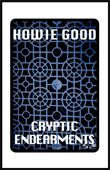January 15, 2013CRYPTIC ENDEARMENTS
Review by CL Bledsoe
The Knives Forks and Spoons Press
122 Birley Street
Newton-le-Willows
Merseyside, WA12 9UN
United Kingdom
ISBN: 978-10907812-93-4
2012, 92 pp., £7.00
Howie Good is one of the most prolific poets publishing in the small press these days. He’s got hundreds of publications and several chapbooks, but the surprising thing is how diverse his poems actually are. Good is equally at home writing endearing love poems, surreal portraits of alienation in post-post America, or socially aware activist pieces. I recently reviewed two chapbooks of Good’s, and I was surprised to see that I hadn’t read a single poem before in any of his myriad publications, and the poems were just as strong as anything else of his I’ve read.
Howie Good’s latest full-length collection begins with “Prophets & Martyrs,” a triptych of desperation and alienation. Section 1 begins: “The panhandler holds up a piece of cardboard. Beep if you know Jesus, shakily written in black marker. Cars behind me do.” Good is unclear with his meaning. He doesn’t honk, perhaps because he doesn’t feel that he “knows Jesus.” But also there’s a commentary there on faith: Is honking enough? If they truly “know Jesus,” shouldn’t they help this man? In Section 2: “The war went on. Something scratched to be let in or, perhaps, let out.” Section 3 includes an even more dire portrait: “Tell my father, Jesus’ son says, that I died with my face to the enemy.” Who is “the enemy?” Sinners? Regardless, his battle seems hopeless. Good goes on to describe a “churchyard strewn with arms and legs that had been amputated and thrown out the window.” This disregard for human life is horrifying and obviously affects people, whom Good describes as “pale,” but they are also “quiet”; they don’t do anything to change the situation, just like those who honk for Jesus, or those who sit in fear of the nameless enemy.
“Undertow” is a powerful lament for a faded, troubled past:
Your hands fall helplessly
to your sides. All the people
you admire are either dead
or secretly sad. You feel
the undertow of everything
that has gone missing.
I should have been there
with you when the little
black flowers broke open.
I should have watched
for children like the sign said.
Good’s language is restrained and clear throughout the bulk of the poem, which allows him to break free with the evocative imagery of black flowers, the perfect sadness. His observations are compelling: I keep coming back to those lines, “All the people/ you admire are either dead/ or secretly sad.” There’s a sardonic hopelessness to it; even the narrator’s heroes haven’t “figured it out” enough to not be unhappy.
“Pornocupia” shows off Good’s humor. He begins:
It’s fashionable
to die young
and be pessimistic.
I myself prefer
a Vicodin
to the present,
But Good isn’t one of these youngsters, spouting nihilism for show; he’s found a kind of hope. He continues:
until later,
when we’re anointing
the bed,
your breasts
floating above me
So, if Good isn’t spouting nihilism, why focus on the negative? In “The World Is Running Down,” he gives us an answer: “Words can’t fix it,/but, in the gray of morning,// I lean over the keyboard/and pretend again they can.”
The title poem lives up to its name:
My mother’s maiden name,
Sternlicht, translates as starlight.
An octopus has three hearts.
The deep water closed over me.
I rang your doorbell and ran.
There’s a child-like playfulness in the poem, which gets to the heart of the redemptive undertone of Good’s work. Sure, there are negative aspects to the world, but there’s also so much more: sex and fun and beauty. But Good isn’t hitting his readers over the head with meaning; he is working towards the appreciation of that salve in his work, and we, as readers, are able to follow him in his journey and hopefully come to these insights on our own. It’s no wonder that Good is so widely published; he’s a true talent who is just coming into his own as a writer, and I look forward to seeing much more from him in the future.